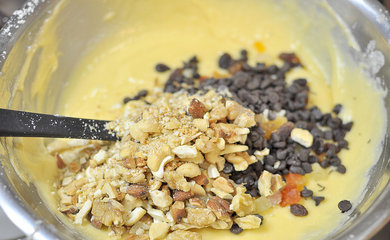The BBC’s Great British Bake-Off is back for another season, much to the delight of those of us who have an odd fascination for food-based reality TV competitions. One wouldn’t think that baking — such a sweet, friendly, lovely activity — would be so cutthroat, but you’d be wrong, especially when it’s airing on the BBC, where the combination of British restraint and reality-show greed clashes absolutely beautifully. The judges aren’t afraid to get ugly, and the same goes for many of the contestants, who are focused on the big prize and aren’t afraid to knock each other aside to get there.
Claire Goodwin was the first to be eliminated (and she was good-spirited about her loss, but the case of Claire’s performance on television (a series of baking disasters, some of which weren’t under her control) is far less interesting than what happened to her on social media. Claire, you see, isn’t just a talented baker: She’s also a larger woman (a self-professed size 22) who is, like most fat people, well aware of how other people perceive her body and talk about it.
I think I always knew that if there was going to be a focus at some point or other on the large – fat – woman making cakes and pies on the telly. When the press were given our photos and biogs last week, a few papers took it upon themselves to call me ‘jolly’. Does anyone know of a thin, glamorous, non red cheeked person being described as ‘jolly’?. The word is stunningly mimetic. As soon as I read it I felt the flap of bingo wings and the ripple of belly. And not just my own. So, yes, I get it, I’m fat and there is something poetic about a large woman in an apron spooning buttercream onto cake and talking about how much she loves pies.
She knew she’d be in for snide comments from the media, but what she wasn’t entirely expecting was her hostile reception on social media, where people made comments about ‘cake-eating contests’ and her weight. Like many fat women facing fat-phobic and shaming comments, she felt undermined and started to question herself.
What I do know is that my weight (anyone’s weight) is not a reason to denigrate everything I do, nor can you define me by this alone. A person should not be defined by any aspect of their appearance. For a second today I felt like I shouldn’t have been in that tent because I am fat.
Her story illustrates not that internet trolls are nasty — that’s something we already know — but that people involved in reality shows are put under immense pressure in exchange for their participation. One might argue that they sign up for it when they apply and go through the lengthy screening process, but that’s not fair; you don’t ‘sign up’ to be abused by random people, and you’re not ‘asking for it’ if you dare to be fat and on a baking show.
Goodwin started to increase her social presence before the show with the goal of connecting with people and getting more widely known, but it’s not uncommon for participation on social media to be one of the requirements for competitors who aren’t already active on it. Networks want to keep the passion for a show going even when it’s not airing, which means soliciting Tweets and comments week-round, but also encouraging people to engage directly with contestants. (On Masterchef, for example, the show goes so far as to include Twitter handles on the chefs’ aprons.)
Contestants are often expected to sit quietly through abuse, which is all the more galling for those who are being made out to be the villains of the series (or the week) through adroit editing. In every season, producers work to establish ‘personalities’ for each contestant, manipulating viewers into responding in very predictable ways. One woman has to be made out to be the ‘bitch,’ while a man is turned into a misogynistic asshole, one woman is sweet, gentle, and totally unprepared, and so forth.
Once they’ve been set up for viewers, they’re supposed to parade on social media and take whatever comes at them from viewers who only know them through the lens of a show that airs for an hour or two a week, and is heavily-edited. Those viewers can be cruel, refusing to acknowledge the humanity of the people they’re trashing with such vicious glee, turning their meanness into a game with memes, .gifs, and other expressions of hatred and mockery for the contestants they dislike.
In a world that’s become filled with reality television, where social media has created an opportunity for everyone to create their own sort of media stream, such attacks are considered common and part of the cost of doing business for those with public profiles. But is it? And should it be? For those on reality shows in particular, networks could be doing more to protect their contestants, including moderating comments and other engagement on social media more carefully, and using their legal team to defend people facing exposure of identifying information, threats, and other risks.
Yet, this, too, becomes part of the drama of the show, and gives the producers all the more to feed on. Contestants of all shapes and sizes are hung out to dry because networks believe that any publicity is good publicity — and if someone suffers in the process, who cares?
Photo by Yoppy, licensed under a Creative Commons Attribution 2.0 Generic license

